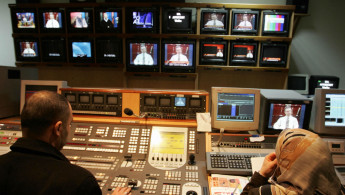Hizballah TV channel dropped by major Arab satellite network
Nilesat, one of the Arab world's biggest satellite transmitters, accused the channel of sectarianism, saying channels "must abide by not airing any violent or racist content, or provoking sectarian strife".
"No other channels have violated the contract," a spokesman told AFP, in response to a question on whether any other Lebanese channels would be affected.
But Hizbollah denied the allegations and "sharply condemned" the unprecedented move.
"This is a political decision, not an industry decision. Al-Manar has nothing to do with sectarian strife," said the channel's general manager Ibrahim Farhat, calling the move "unjust and arbitrary".
"This is part of the political problem in the region that they're taking out on the media," Farhat said.
The decision was part of "the attack against the Resistance [Hizballah] and all its branches by some Arab organisations", the group said.
"We in Hizballah condemn this unjust decision against al-Manar and we demand that the responsible officials at Nilesat immediately rescind this decision," the group said in a statement sent to journalists.
But viewers can still access Al-Manar via a Russian satellite or online, the channel tweeted.
| | |
| Video: Al-Manar responds to Nilesat |
The move came as Saudi King Salman landed in Egypt - the home of the Nilesat satellite network.
Last week, the Beirut offices of Saudi-owned al-Arabiya and its sister channel al-Hadath - both of which offer extensive coverage of political news in the region - were closed "due to the difficult circumstances and challenges on the ground", as well as "concern" for the safety of employees.
Last month, Gulf Arab states led by Saudi Arabia blacklisted Hizballah, the leading force in Lebanon's governing bloc, as a "terrorist" organisation.
The move was copied by the Arab League, less than 24 hours after the Mubarak-era Egyptian foreign minister Ahmed Abdul Gheit was appointed to lead the Cairo-based organisation.
Saudi Arabia halted a $3 billion programme of military aid to Lebanon to protest what it said was "the stranglehold of Hizballah on the state".
It has also urged its citizens to leave Lebanon and avoid travelling there.
Bahrain, Qatar and Kuwait followed with similar travel advisories, while the United Arab Emirates banned its nationals from travel to Lebanon.
The moves come against the backdrop of increased tensions with Tehran this year after demonstrators stormed the kingdom's missions in Iran following Saudi Arabia's execution of a Shia cleric, prompting Riyadh to cut diplomatic ties.





 Follow the Middle East's top stories in English at The New Arab on Google News
Follow the Middle East's top stories in English at The New Arab on Google News


